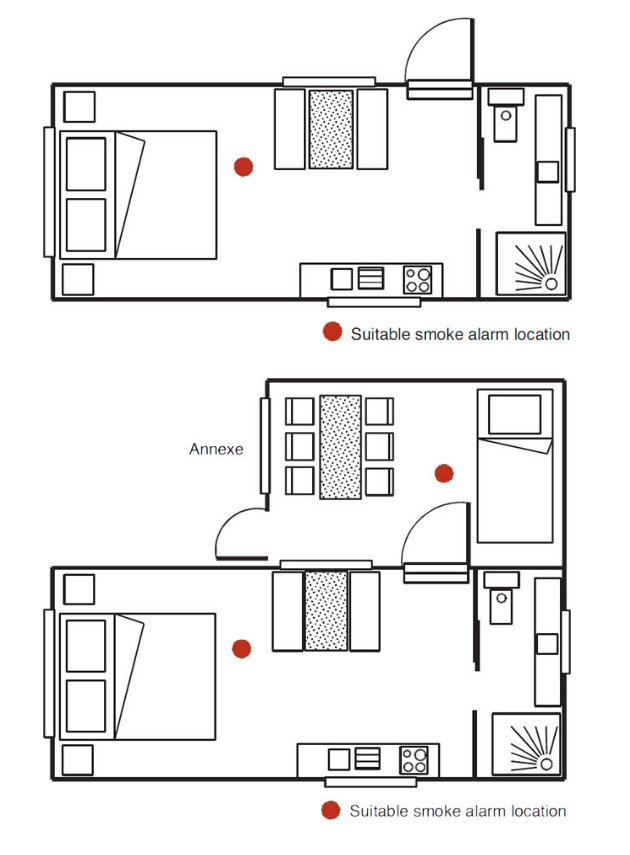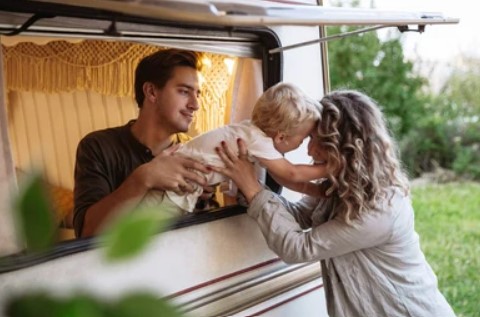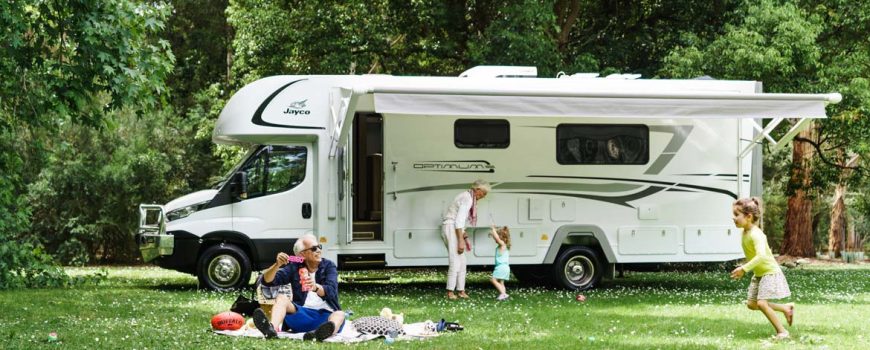Australians love the great outdoors – from Grey Nomads to the #vanlife movement, more people than ever are hitting the road. But while you’ve planned your trip and packed your gear, have you thought about fire safety? A fire alarm in your caravan or campervan could be the lifesaver you never knew you needed.
Why Fire Alarms Are Essential For Caravans!
Caravans and campervans have limited escape routes, and modern materials can burn rapidly. A photoelectric fire alarm provides early warning, giving you precious seconds to escape. Fires spread fast – installing a high-quality fire alarm could mean the difference between safety and disaster.
The Risks of Fire in Caravans & Campervans
Unlike traditional homes, caravans and campervans are built with lightweight materials that can ignite quickly. Upholstery, wooden fixtures, plastic fittings, and even insulation can fuel a fire in seconds. Add to that the presence of gas cooktops, electrical appliances, and fuel sources, and you have a recipe for disaster.
Common causes of caravan fires include:
- Faulty electrical wiring – Aging or poorly installed electrical components can short-circuit and spark fires.
- Cooking accidents – Open flames, oil fires, and unattended stoves are leading fire hazards.
- Gas leaks – LPG systems are convenient for caravans but must be maintained properly to prevent leaks.
- Overloaded power outlets – Using too many appliances at once can cause overheating and electrical fires.
- Heaters & open flames – Portable gas heaters and candles can easily ignite surrounding materials.
How Many Fire Alarms Do I Need? Where Do I Put Them?
It is recommended that you have at least one working photoelectric fire alarm inside the van where the bed is, and one also in the annex if you sleep there – the image below provides a handy visual guide. As per Australian Standard 3786:2014, the smoke alarm(s) should also have an integrated ‘hush’ button which allows it to be temporarily silenced, should the alarm be activated accidentally due to cooking smoke etc.

Fire alarms – recommended location in caravans and campervans
Additional Fire Safety Devices
- Heat detectors – These can supplement smoke alarms in kitchen areas to detect fires without false alarms from cooking.
- Carbon monoxide (CO) alarms – CO poisoning is a silent killer in caravans that use gas appliances.
Are Fire Alarms Legally Required in Caravans?
Fire alarm laws vary across Australian states:
State-by-State Requirements
- NSW, Victoria & NT: Fire alarms are mandatory in all caravans and campervans.
- QLD: As of July 2024, all QLD-registered caravans and motorhomes must have at least one compliant photoelectric fire alarm.
- SA: A fire alarm is required if staying in a caravan for more than 60 days.
- Other States: Fire alarms are strongly recommended but not legally required.
Failure to comply can result in fines: up to $774 in QLD, $200 on-the-spot fines in NSW, and up to $550 if taken to court.
Recent news has further highlighted the lack of mandated fire alarms in Australian caravans, and fatalities due to caravan fires unfortunately occur annually. Don’t allow yourself to become a statistic – the short video below contains some great caravan fire safety advice from the QLD Fire Department (formerly called QLD Fire and Emergency Services).
Pro Tips! – Caravan Fire Safety
🚨 Store Gas Cylinders Safely
Gas leaks are a major fire hazard. Always:
- Keep gas cylinders outside the van in a well-ventilated area.
- Ensure cylinders are securely fastened to prevent movement.
- Turn off gas valves when not in use.
- Regularly check hoses and fittings for leaks or wear.
⚡ Maintain Electrical Appliances
Faulty electrical components are a leading cause of caravan fires. To reduce risk:
- Have appliances and power points checked by an electrician.
- Avoid daisy-chaining power boards.
- Keep cables away from heat sources and moisture.
- Use low-wattage appliances designed for caravan use.
🔥 Choose Your Parking Spot Wisely
- Avoid parking in dry grass or near flammable vegetation.
- Look for cleared areas free from spinifex growth.
- Never park too close to other vans, as fire can spread rapidly.
🍳 Safe Cooking Practices
Cooking inside a caravan poses risks. Follow these safety tips:
- Never cook while the caravan is moving.
- Always supervise cooking – unattended stoves are dangerous.
- Keep flammable items away from burners.
- Set up BBQs at least 5m away from the van.
🧯 Fire Extinguishers & Fire Blankets
- Install a DCP (Dry Chemical Powder) fire extinguisher near the exit.
- Keep a fire blanket accessible for small fires, such as stove-top blazes.
- Regularly check extinguisher pressure and replace it when necessary.
- Practice using the fire blanket so you know how to respond in an emergency.

Install a photoelectric smoke alarm in your campervan
Fire Safety Checklist Before Your Next Road Trip
✅ Does your caravan have a working fire alarm, fire extinguisher, and fire blanket?
✅ Have you prepared an escape plan and checked that exits are clear?
✅ Are LPG cylinders secure and in good working order?
✅ Have electrical appliances been inspected by a qualified electrician?
✅ Do you have the EmergencyPlus app installed for GPS-based emergency assistance?
Real-Life Fire Incidents in Caravans
Recent news has highlighted the dangers of not having fire alarms in caravans. Several fatal caravan fires occur every year in Australia, with many preventable by early detection.
Case Study: Avoidable Caravan Fire in QLD
In 2023, a tragic caravan fire in Queensland resulted in multiple fatalities. The investigation found that no working fire alarm was installed. Had there been a functioning photoelectric fire alarm, it might have alerted the occupants in time to escape.
Stay Safe with ZEN Fire Alarms
Protect your caravan and loved ones with ZEN’s high-quality, photoelectric fire alarms. Designed for ultimate safety, they provide reliable early warning in case of fire. These alarms are easy to install, completely wireless, and powered by a long-lasting 10-year battery, ensuring hassle-free fire protection. With no need for wiring or an electrician, you can quickly enhance your safety and comply with regulations. Whether you’re on the road or parked at a campsite, ZEN fire alarms offer peace of mind, keeping you and your family safe from potential fire hazards.

Want to know more? Watch our ZEN Smoke Alarm YouTube channel or call us on 0478 596 402 today
We love talking smoke alarms!
ZEN Interconnected Smoke Alarms
New Farm, QLD, 4005

